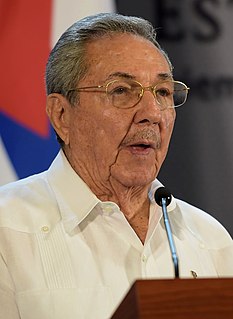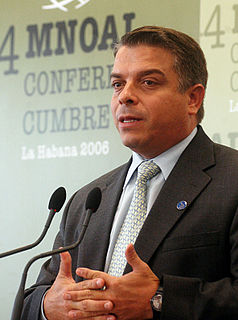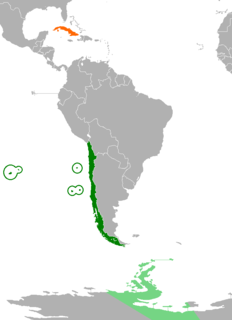
Cuba's foreign policy has been fluid throughout history depending on world events and other variables, including relations with the United States. Without massive Soviet subsidies and its primary trading partner, Cuba became increasingly isolated in the late 1980s and early 1990s after the fall of the USSR and the end of the Cold War, but Cuba opened up more with the rest of the world again starting in the late 1990s when they have since entered bilateral co-operation with several South American countries, most notably Venezuela and Bolivia beginning in the late 1990s, especially after the Venezuela election of Hugo Chávez in 1999, who became a staunch ally of Castro's Cuba. The United States used to stick to a policy of isolating Cuba until December 2014, when Barack Obama announced a new policy of diplomatic and economic engagement. The European Union accuses Cuba of "continuing flagrant violation of human rights and fundamental freedoms". Cuba has developed a growing relationship with the People's Republic of China and Russia. In all, Cuba continues to have formal relations with 160 nations, and provided civilian assistance workers – principally medical – in more than 20 nations. More than one million exiles have escaped to foreign countries. Cuba's present foreign minister is Bruno Rodríguez Parrilla.

The Organization of American States is an international organization that was founded on 30 April 1948 for the purposes of solidarity and co-operation among its member states within the Americas. Headquartered in the United States capital, Washington, D.C., the OAS has 35 members, which are independent states in the Americas. Since the 1990s, the organization has focused on election monitoring. The head of the OAS is the Secretary General; the incumbent is Uruguayan Luis Almagro.

Cuba has had a socialist political system since 1959 based on the "one state – one party" principle. Cuba is constitutionally defined as a Marxist–Leninist socialist state guided in part by the political ideas of Karl Marx, one of the fathers of historical materialism, Friedrich Engels, and Vladimir Lenin. Despite being regarded as a one-party Communist state, the Cuban government claims the nationalist ideology of José Martí is what serves as the main source of influence in Cuban politics. The present Constitution of Cuba, which was passed in a 2019 referendum, also describes the role of the Communist Party of Cuba to be the "leading force of society and of the state" and as having the capability of setting national policy, and First Secretary of the Communist Party is the most powerful position in Cuba. The 2019 Constitution of Cuba identifies the ideals represented by Cuban independence hero José Martí and revolutionary leader Fidel Castro as the primary foundation of Cuba's political system, while also stressing the importance of the influence of the ideas of Marx, Engels, and Lenin.

Raúl Modesto Castro Ruz is a retired Cuban politician and general who served as the first secretary of the Communist Party of Cuba, the most senior position in the one-party communist state, from 2011 to 2021, succeeding his brother Fidel Castro.

The Cuban Liberty and Democratic Solidarity (Libertad) Act of 1996, Pub.L. 104–114 (text)(PDF), 110 Stat. 785, 22 U.S.C. §§ 6021–6091) is a United States federal law which strengthens and continues the United States embargo against Cuba. It extended the territorial application of the initial embargo to apply to foreign companies trading with Cuba, and penalized foreign companies allegedly "trafficking" in property formerly owned by U.S. citizens but confiscated by Cuba after the Cuban revolution. It also covers property formerly owned by Cubans who have since become U.S. citizens.

The United States embargo against Cuba prevents American businesses, and businesses organized under U.S. law or majority-owned by American citizens, from conducting trade with Cuban interests. It is the most enduring trade embargo in modern history. The US first imposed an embargo on the sale of arms to Cuba on March 14, 1958, during the Fulgencio Batista regime. Again on October 19, 1960, almost two years after the Cuban Revolution had led to the deposition of the Batista regime, the US placed an embargo on exports to Cuba except for food and medicine after Cuba nationalized the US-owned Cuban oil refineries without compensation. On February 7, 1962, the embargo was extended to include almost all exports. The United Nations General Assembly has passed a resolution every year since 1992 demanding the end of the US economic embargo on Cuba, with the US and Israel being the only nations to consistently vote against the resolutions.

Felipe Ramón Pérez Roque was the Minister of Foreign Affairs of Cuba from 1999 to 2009. At his appointment, he was not only the youngest member of the Cuban cabinet but also the only one to be born after the Cuban Revolution in 1959.

Ricardo Alarcón de Quesada was a Cuban politician. He served as his country's Permanent Representative to the United Nations (UN) for nearly 30 years and later served as Minister of Foreign Affairs from 1992 to 1993. Subsequently, Alarcón was President of the National Assembly of People's Power from 1993 to 2013, and because of this post, was considered the third-most powerful figure in Cuba. He was also until 2013 a Member of the Central Committee of the Communist Party of Cuba.

Cuba and the United States restored diplomatic relations on July 20, 2015. Relations had been severed in 1961 during the Cold War. U.S. diplomatic representation in Cuba is handled by the United States Embassy in Havana, and there is a similar Cuban Embassy in Washington, D.C. The United States, however, continues to maintain its commercial, economic, and financial embargo, making it illegal for U.S. corporations to do business with Cuba.
The 2006–2008 Cuban transfer of presidential duties was the handover of the title of president and presidential duties from longtime Cuban leader Fidel Castro to his brother Raúl Castro, the next-in-line-of-succession person in Cuba, following Fidel's operation and recovery from an undisclosed digestive illness believed to be diverticulitis. Although Raúl Castro exercised the duties of president, Fidel Castro retained the title of President of the Council of State of Cuba and President of the Council of Ministers of Cuba, during this period.

The Cuban Democracy Act (CDA), also known as the Torricelli Act or the Torricelli-Graham Bill, was a bill introduced and sponsored by U.S. Congressman Robert Torricelli and aimed to tighten the U.S. embargo on Cuba. It reimplemented the ban of U.S. subsidiaries in other countries from trading with Cuba, hindered the ability for ships docked within Cuban ports to travel to U.S. ports, and worked to circumvent other aspects of the embargo to provide humanitarian aid to Cuba in an attempt to draw the Cuban people closer to the United States.

Relations between Cuba and Venezuela were established in 1902. The relationship deteriorated in the 1960s and Venezuela broke relations in late 1961 following the Betancourt Doctrine policy of not having ties with governments that had come to power by non-electoral means. A destabilizing factor was the Cuban support for the antigovernment guerrilla force that operates in remote rural areas. Venezuela broke off relations with Cuba after the Machurucuto invasion in 1967, when Cuban trained guerrillas landed in Venezuela seeking to recruit guerrillas and overthrow the government of Raúl Leoni. Relations were reestablished in 1974.
The Inter-American Democratic Charter was adopted on 11 September 2001 by a special session of the General Assembly of the Organization of American States, held in Lima, Peru. It is an inter-American instrument with the central aim of strengthening and upholding democratic institutions in the nations of the Americas. The Charter, which is binding on all 34 of the currently active OAS member states, spells out what democracy entails and specifies how it should be defended when it is under threat.

Bruno Eduardo Rodríguez Parrilla is a Cuban diplomat and politician. He is a member of the Politburo of the Communist Party of Cuba, and has served as Cuba's Minister of Foreign Affairs since 2009.

Chile–Cuba relations refers to interstate relations between the Republic of Chile and the Republic of Cuba. Cuba has been, since the 1960s, a reference point to left wing politicians in Chile.

All 35 independent nations of the Americas are member states of the Organization of American States (OAS).

The Cuban Revolution was not only fought by armed rebels on the battlefield but also through the propaganda campaigns designed and orchestrated by Fidel Castro and his rebel comrades. Propaganda in Cuba during the revolution included Castro's use of personal interviews with journalists, radio broadcasts and publicity seeking operations that contributed significantly to the victory of the rebels over Fulgencio Batista's government and provided insight into the successful propaganda campaign established by Castro after gaining power. The limited yet successful revolutionary propaganda apparatus transitioned into what Castro has called "one of the most potent weapons in his foreign policy arsenal." Today the Cuban government maintains an intricate propaganda machine that includes a global news agency, magazines, newspapers, broadcasting facilities, publishing houses, front groups, and other miscellaneous organizations that all stem from the modest beginnings of Castro's revolutionary propaganda machine.

Cuba–Uruguay relations refers to the diplomatic relations between the Republic of Cuba and the Oriental Republic of Uruguay. Both nations are members of the Community of Latin American and Caribbean States, Group of 77, Organization of Ibero-American States and the United Nations.

Cuba–Mexico relations are diplomatic and bilateral relations between the Republic of Cuba and the United Mexican States. Both nations are members of the Association of Caribbean States, Community of Latin American and Caribbean States, Latin American Integration Association, Organization of Ibero-American States and the United Nations.

Current and historical relations between Argentina and Cuba, have existed for over a century. Both nations are members of the Community of Latin American and Caribbean States, Latin American Integration Association, Organization of American States and the Organization of Ibero-American States.

















